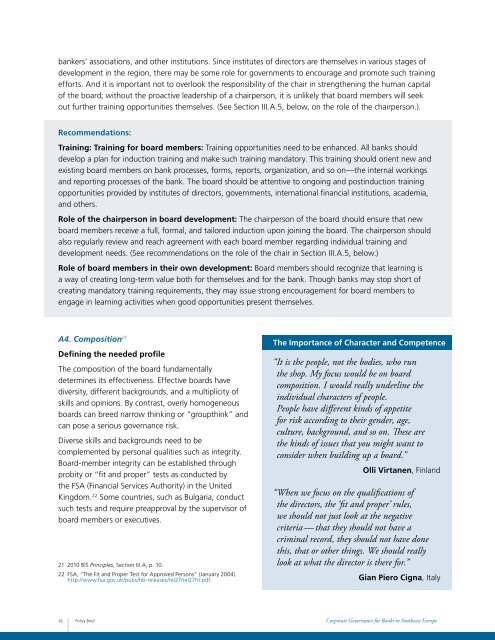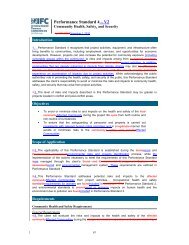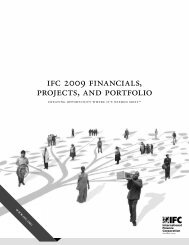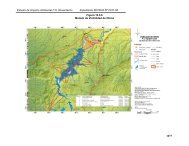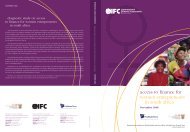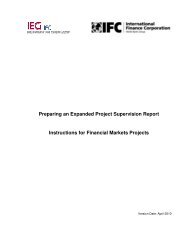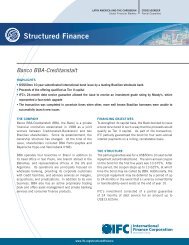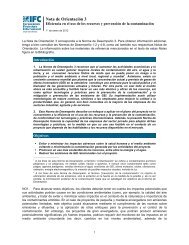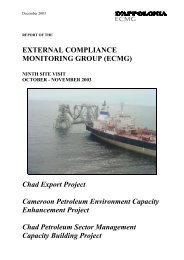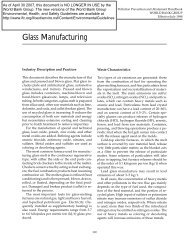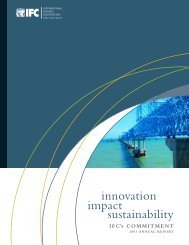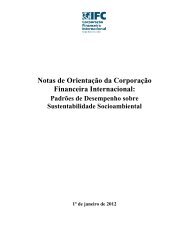Corporate Governance for Banks in Southeast Europe: Policy - IFC
Corporate Governance for Banks in Southeast Europe: Policy - IFC
Corporate Governance for Banks in Southeast Europe: Policy - IFC
Create successful ePaper yourself
Turn your PDF publications into a flip-book with our unique Google optimized e-Paper software.
ankers’ associations, and other <strong>in</strong>stitutions. S<strong>in</strong>ce <strong>in</strong>stitutes of directors are themselves <strong>in</strong> various stages of<br />
development <strong>in</strong> the region, there may be some role <strong>for</strong> governments to encourage and promote such tra<strong>in</strong><strong>in</strong>g<br />
ef<strong>for</strong>ts. And it is important not to overlook the responsibility of the chair <strong>in</strong> strengthen<strong>in</strong>g the human capital<br />
of the board; without the proactive leadership of a chairperson, it is unlikely that board members will seek<br />
out further tra<strong>in</strong><strong>in</strong>g opportunities themselves. (See Section III.A.5, below, on the role of the chairperson.).<br />
Recommendations:<br />
Tra<strong>in</strong><strong>in</strong>g: Tra<strong>in</strong><strong>in</strong>g <strong>for</strong> board members: Tra<strong>in</strong><strong>in</strong>g opportunities need to be enhanced. All banks should<br />
develop a plan <strong>for</strong> <strong>in</strong>duction tra<strong>in</strong><strong>in</strong>g and make such tra<strong>in</strong><strong>in</strong>g mandatory. This tra<strong>in</strong><strong>in</strong>g should orient new and<br />
exist<strong>in</strong>g board members on bank processes, <strong>for</strong>ms, reports, organization, and so on—the <strong>in</strong>ternal work<strong>in</strong>gs<br />
and report<strong>in</strong>g processes of the bank. The board should be attentive to ongo<strong>in</strong>g and post<strong>in</strong>duction tra<strong>in</strong><strong>in</strong>g<br />
opportunities provided by <strong>in</strong>stitutes of directors, governments, <strong>in</strong>ternational f<strong>in</strong>ancial <strong>in</strong>stitutions, academia,<br />
and others.<br />
Role of the chairperson <strong>in</strong> board development: The chairperson of the board should ensure that new<br />
board members receive a full, <strong>for</strong>mal, and tailored <strong>in</strong>duction upon jo<strong>in</strong><strong>in</strong>g the board. The chairperson should<br />
also regularly review and reach agreement with each board member regard<strong>in</strong>g <strong>in</strong>dividual tra<strong>in</strong><strong>in</strong>g and<br />
development needs. (See recommendations on the role of the chair <strong>in</strong> Section III.A.5, below.)<br />
Role of board members <strong>in</strong> their own development: Board members should recognize that learn<strong>in</strong>g is<br />
a way of creat<strong>in</strong>g long-term value both <strong>for</strong> themselves and <strong>for</strong> the bank. Though banks may stop short of<br />
creat<strong>in</strong>g mandatory tra<strong>in</strong><strong>in</strong>g requirements, they may issue strong encouragement <strong>for</strong> board members to<br />
engage <strong>in</strong> learn<strong>in</strong>g activities when good opportunities present themselves.<br />
A4. Composition 21<br />
Def<strong>in</strong><strong>in</strong>g the needed profile<br />
The composition of the board fundamentally<br />
determ<strong>in</strong>es its effectiveness. Effective boards have<br />
diversity, different backgrounds, and a multiplicity of<br />
skills and op<strong>in</strong>ions. By contrast, overly homogeneous<br />
boards can breed narrow th<strong>in</strong>k<strong>in</strong>g or “groupth<strong>in</strong>k” and<br />
can pose a serious governance risk.<br />
Diverse skills and backgrounds need to be<br />
complemented by personal qualities such as <strong>in</strong>tegrity.<br />
Board-member <strong>in</strong>tegrity can be established through<br />
probity or “fit and proper” tests as conducted by<br />
the FSA (F<strong>in</strong>ancial Services Authority) <strong>in</strong> the United<br />
K<strong>in</strong>gdom. 22 Some countries, such as Bulgaria, conduct<br />
such tests and require preapproval by the supervisor of<br />
board members or executives.<br />
21 2010 BIS Pr<strong>in</strong>ciples, Section III.A, p. 10.<br />
22 FSA, “The Fit and Proper Test <strong>for</strong> Approved Persons” (January 2004).<br />
http://www.fsa.gov.uk/pubs/hb-releases/rel27/rel27fit.pdf.<br />
The Importance of Character and Competence<br />
“It is the people, not the bodies, who run<br />
the shop. My focus would be on board<br />
composition. I would really underl<strong>in</strong>e the<br />
<strong>in</strong>dividual characters of people.<br />
People have different k<strong>in</strong>ds of appetite<br />
<strong>for</strong> risk accord<strong>in</strong>g to their gender, age,<br />
culture, background, and so on. These are<br />
the k<strong>in</strong>ds of issues that you might want to<br />
consider when build<strong>in</strong>g up a board.”<br />
Olli Virtanen, F<strong>in</strong>land<br />
“When we focus on the qualifications of<br />
the directors, the ‘fit and proper’ rules,<br />
we should not just look at the negative<br />
criteria — that they should not have a<br />
crim<strong>in</strong>al record, they should not have done<br />
this, that or other th<strong>in</strong>gs. We should really<br />
look at what the director is there <strong>for</strong>.”<br />
Gian Piero Cigna, Italy<br />
16<br />
<strong>Policy</strong> Brief<br />
<strong>Corporate</strong> <strong>Governance</strong> <strong>for</strong> <strong>Banks</strong> <strong>in</strong> <strong>Southeast</strong> <strong>Europe</strong>


